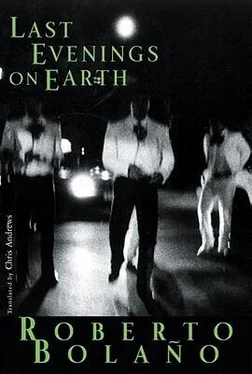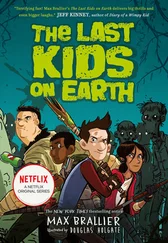From that point on, Cavernas's attitude changed. He started to look askance at me, my friend recalled. What the fuck do dentists know about art? he said. He asked if I was an out-and-out faggot or if it was just a phase I was going through. Naturally it took my friend a while to realize he was being insulted. Before he could react and explain that what he felt for Cavernas was simply the admiration of an art lover for the work of a misunderstood genius, one of the world's truly great painters, the genius had made himself scarce.
It was a while before my friend found him again. As he searched, he rehearsed in his head what he would say. Finally he spotted the painter on the balcony, with two guys who looked like gangsters. Cavernas saw him coming and said something to his companions. My friend the dentist smiled. Cavernas's companions smiled too. My friend was probably rather more drunk than he realized, or than he cared to remember. In any case the painter greeted him with an insult and the two heavies grabbed him by his arms and his waist and dangled him over the balcony. My friend passed out.
He vaguely remembered Cavernas calling him a faggot again, and the men laughing as they dangled him, cars parked in the sky, a grey sky like the Calle Sevilla. Knowing for certain that he was going to die, and for nothing, or for something completely stupid; knowing that his life, the life he was about to lose, had been one long series of stupidities— in other words, nothing. And there was not even any dignity in that certain knowledge.
He told me all this as we drank tequila in that cheap restaurant in one of the poor neighborhoods of Irapuato, which, needless to say, didn't have a liquor licence. Then he launched into an argument whose principal objective was to discredit art. Cavernas's engravings, I knew, were still hanging in my friend's living room and I had no reason to suspect that he had taken any steps to sell them. When I tried to point out that what had happened between him and Cavernas was an incident in his life story, not an episode in art history, so that it might be used to discredit certain persons, but not artists in general and certainly not art itself, my friend hit the roof.
But that's where art comes from, he said: life stories. Art history comes along only much later. That's what art is, he said, the story of a life in all its particularity. It's the only thing that really is particular and personal. It's the expression of and, at the same time, the fabric of the particular. And what do you mean by the fabric of the particular? I asked, supposing he would answer: Art. I was also thinking, indulgently, that we were pretty drunk already and that it was time to go home. But my friend said: What I mean is the secret story.
With a gleam in his eye he stared at me for a moment. The death of the Indian woman from gum cancer had obviously affected him more than I had realized at first.
So now you're wondering what I mean by the secret story? asked my friend. Well, the secret story is the one we'll never know, although we're living it from day to day, thinking we're alive, thinking we've got it all under control and the stuff we overlook doesn't matter. But every single damn thing matters! Only we don't realize. We just tell ourselves that art runs on one track and life, our lives, on another, and we don't realize that's a lie.
And what separates one track from the other? he asked me. I must have said something, although I can't remember what; in any case at that point my friend saw someone he knew, turned away from me, and started waving. I remember that the restaurant had been gradually filling up with people. I remember that there were green tiles on the walls, like a public urinal, and that the bar, deserted before, was now thronged with weary, jovial, or sinister-looking characters. I remember a blind man singing a song in the corner of the room or maybe the song was about a blind man. A cloud of smoke had accumulated over our heads. Then the object of my friend's attention approached our table.
He can't have been more than sixteen years old. He looked younger. He was rather short, and could have been strongly built but was filling out and losing definition. His clothes were cheap, but there was something vaguely incongruent about them, as if they were sending a garbled message from various places at once, and he was wearing a pair of worn-out tennis shoes, shoes that my friends and I, or rather the children of some of my friends, would long ago have laid to rest on a closet floor or dispatched to the garbage dump.
He sat down at our table and my friend told him to order whatever he liked. It was then that he smiled for the first time. It wasn't what you'd call a pleasant smile; on the contrary, it was wary and suspicious, the smile of someone who expects little from others and all of it bad. Then, as the boy sat down with us and exhibited his wintry smile, it occurred to me that perhaps my friend, a confirmed bachelor who could have chosen to live in Mexico City years ago but had preferred to stay in his hometown, Irapuato, had become, or had always been, a homosexual, and that for some obscure reason this fact, kept secret for years, had emerged in the course of our conversation that night about the Indian woman and her cancerous gum. But I soon discarded this idea and concentrated on the newcomer. Or perhaps what happened was that his eyes, which I hadn't noticed until then, compelled me to put aside my fears (since in those days, even the remote possibility that my friend might be a homosexual frightened me) and turn my full attention to the boy, who seemed to be suspended between adolescence and an appalling childhood.
His eyes were — I don't know how else to put it— forceful. That was the adjective that occurred to me at the time, and clearly it fell far short of capturing their palpable effect — the impact they made when you met his gaze, like an ache between the eyebrows — but I still can't come up with a better word. Though his body, as I said, was filling out toward the ampler forms of years to come, his eyes were all sharpness, sharpness in movement.
My friend introduced him with undisguised pleasure. His name was Josй Ramнrez. I held out my hand (I don't know why; I'm not normally so formal, at least not in bars, at night) and he hesitated for a moment. His handshake took me completely by surprise. His right hand, which I had expected to be smooth and indecisive, like a typical adolescent hand, was so covered in calluses it felt like iron. It was quite a small hand, and now that I think back to that night in the suburbs of Irapuato, the hand I see in my mind's eye is small, a small outstretched hand against a background of darkness and the bar's feeble gleams, a hand emerging from parts unknown, like the tentacle of a storm, but hard as iron, a hand forged by a blacksmith.
My friend was smiling. For the first time that day I saw a glimmer of happiness in his face, as if the physical presence of Josй Ramнrez (with his round face, sharp eyes, and hard hands) had dispelled both his guilt about the Indian woman with her cancerous mouth and the recurrent malaise caused by his memory of the painter Cavernas. As if in reply to a question that elementary good manners forbade me to ask, although I was tempted, my friend said that he had met Josй Ramнrez through his work.
It took me a moment to realize that he was referring to his dental practice. Free treatment, said the boy, with a voice that, like his eyes and hands, was at odds with the rest of his body. At the cooperative, said my friend. I did six fillings for him: a work of art. Josй Ramнrez nodded and lowered his eyes. It was as if he had reassumed his true identity, that of a sixteen-year-old boy. Later on, I remember, we ordered more drinks and Josй Ramнrez ate a serving of corn tortillas with chili (he didn't want anything more, although my friend kept saying, Order whatever you like, it's my treat).
Читать дальше












